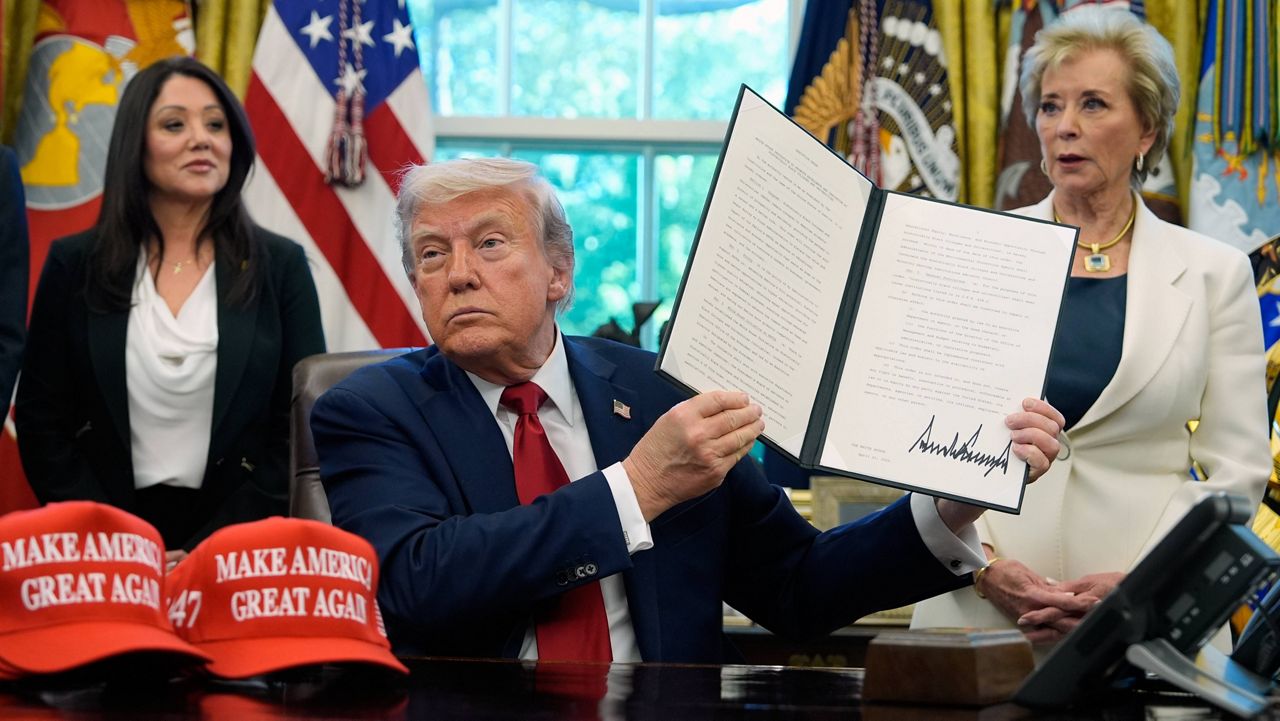A bipartisan group of unlikely allies in Congress have banded together to take on stock trading by their colleagues, a practice they say leads to conflicts of interest and potential corruption.
It’s not the first effort to do so, but the idea has gained significant traction among certain corners of Congress despite opposition by top lawmakers, including Rep. Nancy Pelos, D-Calif., during her tenure as Speaker of the House.
Rep. Brian Fitzpatrick, R-Pa., the co-chair of the centrist Bipartisan Problem Solvers Caucus, introduced the bill alongside the face of the progressive movement in the House, Rep. Alexandria Ocasio-Cortez, D-N.Y., far-right Republican Rep. Matt Gaetz, R-Fla., and relative moderate Rep. Raja Krishnamoorth, D-Ill.
“The fact that Members of the Progressive Caucus, the Freedom Caucus, and the Bipartisan Problem Solvers Caucus, reflecting the entirety of the political spectrum, can find common ground on key issues like this should send a powerful message to America,” Fitzpatrick said in a statement. “We must move forward on issues that unite us, including our firm belief that trust in government must be restored, and that Members of Congress, including their dependents, must be prohibited from trading in stocks while they are serving in Congress and have access to sensitive, inside information.”
The bill, dubbed the “Bipartisan Restoring Faith in Government Act” would ban members of Congress, their spouses, and dependents from investing in securities, such as stocks and bonds, or commodities, such as oil or gold or agricultural products. Alternatively, federal lawmakers could place their investments in a blind trust run by someone who does “not have a close personal or business relationship” with the Senator or House member whose portfolio they oversee.
Lawmakers and their spouses would have 90 days from the bill’s signing to divest or place their investments in a blind trust. The Senate and House’s ethics offices would be required to inform the Department of Justice of noncompliance and the Attorney General would then be tasked with pursuing civil cases with penalties as high as $50,000. Fines could not be paid with campaign or official funds if the bill passes.
Exceptions to the restrictions would include “a widely held investment fund,” like a mutual fund or pension plan, U.S. Treasury bonds and federal retirement plans.
“When Members have access to classified information, we should not be trading in the stock market on it. It’s really that simple,” Ocasio-Cortez said. Krishnamoorthi added his congressional colleagues “must be focused on their constituents, not their stock portfolios.”
Ocasio-Cortez and Gaetz backed similar legislation written by Krishnamoorthi last session, but the bill died in committee. Other bipartisan efforts in the House and Senate faced similar fates, including one backed by Fitzpatrick and Gaetz.
“AOC is wrong a lot, she would probably say the same thing about me, but she is not corrupt,” Gaetz said on Fox News Tuesday. “And I will work with anyone and everyone to ensure that Congress is not so compromised.”
According to their most recent financial disclosures, Ocasio-Cortez has not directly purchased stocks during her tenure in Congress, while Gaetz sold between $65,000 and $150,000 in stocks in 2019, but had not purchased any as of 2021. In 2020, Krishnamoorthi held “restricted shares” of Sphere Commerce, a healthcare payment software company, after they purchased another company he was invested in. Fitzpatrick appears to have never held stock while in Congress.
The trading of stocks by members of Congress has drawn increasing scrutiny in recent years. Senators of both parties — including then-Sens. Kelly Loeffler and David Perdue, both Georgia Republicans, as well as Sen. Richard Burr, D-N.C., and Sen. Dianne Feinstein, D-Calif., — either dumped stocks or invested in medical companies after receiving classified briefings on the spread of COVID-19 prior to the widespread public understanding of the pandemic’s severity.
Feinstein, who said her husband conducted the trades, was interviewed by the FBI and Burr stepped down as chair of the Senate’s Intelligence Committee after the FBI seized his phone. Ultimately, no charges were filed in any case.
A 2021 investigation by Business Insider found dozens of federal lawmakers and over 180 congressional staffers were likely violating the STOCK Act, a little-enforced law passed in 2012 that prohibits members and employees of Congress from using “nonpublic information derived from their official positions for personal benefit.” According to Business Insider, only a handful of lawmakers faced penalties for violating the law in the decade since its enactment.
More recently, as the banking sector faced tumult amid the collapse of two regional banks, members of Congress unloaded their investments in those banks and invested in others after being briefed on the crisis.
One lawmaker, Rep. Nicole Malliotakis, R-N.Y., bought shares of New York Community Bancorp on March 17, five days after she was briefed by federal and state financial regulators and just days prior to Bancorp's subsidiary acquiring the failing Signature Bank. Initially, in a required filing to the House clerk, Malliotakis said her spouse made the trade; the congresswoman is unmarried, according to a local paper, the Staten Island Advance.
A Malliotakis spokesperson told Spectrum News there was no mention of the bank in her briefing and that she did not learn of the acquisition until it became public on March 19. The spokesperson added the congresswoman's portfolio is managed by a financial adviser who believed the bank's stock was a good long-term investment. The buy was for less than $5,000, per the spokesperson.
Additionally, the marking down of the purchase as by a spouse was a clerical error, Malliotakis' spokesperson added, and will be addressed on her annual financial disclosure form.
A spokesperson for Malliotakis later told the Advance she backed a bipartisan bill sponsored by Rep. Abigail Spanberger, D-Va., and Rep. Chip Roy, R-Tx., that would require members of Congress put some investments in a blind trust. But the spokesperson declined to expand on Malliotakis’ motivations for supporting the legislation.
And last week, Rep. Lois Frankel, D-Fla., revealed she sold between $1,001 and $15,000 in stock from First Republic Bank on March 16, the day the Treasury Department announced 11 large banks would pour $30 billion into the failing midsized institution.
“It's a scandal that Members of Congress are still allowed to own and trade individual stocks while casting votes that move markets and transform economic sectors," said Emma Lydon, the managing director of Progressive the Change Campaign Committee, in a statement on Tuesday. "The House should take swift action to pass this critical, bipartisan anti-corruption legislation to restore public trust in our democracy."
CORRECTION: This article initially incorrectly listed the date of Rep. Nicole Malliotakis' stock purchase. This article has been updated to reflect the accurate dates.





_crop)


